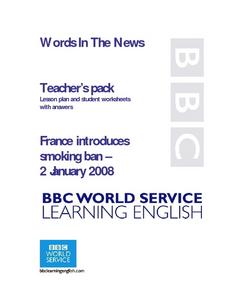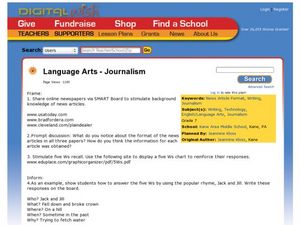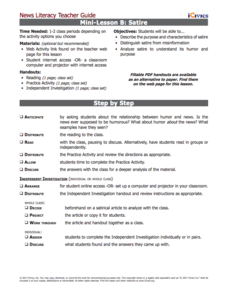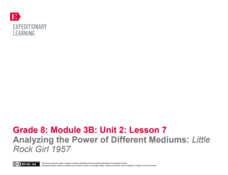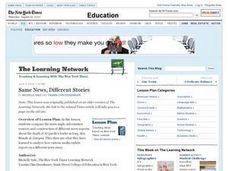Curated OER
Press Review
How can word choice affect a political speech? Middle and high schoolers examine the text of the 1999 State of the Union Address, and then determine how newspaper articles and television reports describe and analyze the event. Use this...
Facing History and Ourselves
Verifying Breaking News
The attempts of journalists to verify the events surrounding the shooting of Michael Brown take center stage as individuals analyze three of the initial newspaper accounts of the story. The whole class discussion then focuses on the...
Curated OER
How to Write a Newspaper Article
Students write a newspaper article. For this journalism lesson, students discover the essential parts of a newspaper article and work in pairs to identify them. Students write a short article of their own, making sure to include all the...
California Education Partners
Summer Olympics
Quickly get to the decimal point. The last assessment in a nine-part series requires scholars to work with decimals. Pupils compare the race times of several athletes and calculate how much they have improved over time. During the second...
University of Arkansas
Assessment and Discussion
"Without concerned citizen action to uphold them (human rights) close to home; we shall look in vain for progress in the larger world. . ." Eleanor Roosevelt's comment is used to set the stage for the conclusion of a five-lesson unit...
Nemours KidsHealth
Media Literacy and Health: Grades 9-12
An essential skill for 21st-century learners is to know how to find reliable sources of information. Two activities help high schoolers learn how to determine the reliability of health-related news from websites, TV, magazines, or...
Prestwick House
Understanding Language: Slant, Spin, and Bias in the News
We live in a time of fake news, alternative realities, and media bias. What could be more timely than an activity that asks class members to research how different sources report the same topic in the news?
Facing History and Ourselves
The Power of Images
One picture but a thousand stories. As a part of a case study of how the death of Michael Brown was reported by professional news sources and on social media class members examine the reactions of various groups to a photograph taken by...
Curated OER
France Introduces Smoking Ban
Students read, discuss and analyze a newspaper article about France introducing a ban on smoking in bars, cafes and restaurants. They assess the key vocabulary words used in the article and view the grammar side of the article.
Curated OER
Mars Bars To Remain Vegetarian
Students read, analyze and critique a newspaper article about a chocolate manufacturer that reverses their decision to change ingredients. They assess key vocabulary terms found in the article and explore how to write a recipe.
Curated OER
Language Arts - Journalism
Seventh graders investigate the journalism techniques of professionals by identifying the 5 W's. In this investigative writing lesson, 7th graders read several news articles and describe the format used for most news articles. Students...
Curated OER
Creating a Newspaper
Get the scoop with a fun, engaging newspaper project. After analyzing the parts of a newspaper, including the headline, subtitles, and pictures or images, young journalists get to work by writing their own stories in a newspaper article...
iCivics
Lesson 3: Bias
How do journalists balance bias and ethical reporting? The final lesson in a series of five from iCivics examines the different types of bias and how they affect the news we read. Young reporters take to the Internet to find examples of...
Newseum
Journalists Code of Ethics
Journalists are supposed to adhere to a Code of Ethics. To determine the degree to which reporters follow this code, individuals select three recent stories with photographs from newspapers, magazines, online news sites, or television...
iCivics
Mini-Lesson B: Satire
Hey, what's so funny? Explore the use of satire in a variety of media with a hands-on instructional activity. Fourth in a five-part journalism series from iCivics, the activity introduces satirical language in print and online. Pupils...
EngageNY
Analyzing the Power of Different Mediums: Little Rock Girl 1957
Scholars begin the instructional activity by watching a video of media history and discussing it in a Turn and Talk. They then look at the texts A Mighty Long Way and Little Rock Girl 1957 to make a connection to the role of the press in...
Curated OER
Inquiring Minds Want to Know 2
In this writing worksheet, students read and analyze 4 newspaper headlines which are unusual and intriguing. Students choose one and write the newspaper article which could have matched the headline.
Curated OER
What are the benefits of having a Free Press?
Students examine why actual malice is necessary in libel cases. Students demonstrate the importance of a third party in libel and slander cases. They analyze why a free press is essential in American society.
Curated OER
Same News, Different Stories
Students compare the news angle, information sources and construction of different news reports about the death of Al Qaeda's leader in Iraq, Abu Musab al-Zarqawi. They analyze how various media outlets report on a different news story.
Turabian Teacher Collaborative
Parts of Argument II: Article Critique
Break down the parts of argumentative writing with a critical thinking activity. High schoolers read an article of your (or their choice), and use a graphic organizer to delineate the ways the author structures his or her arguments.
Brown University
Following the U.S. Presidential Election
Election years provide the opportunity to evaluate news media as well as the next prospective president. High schoolers read about the same event in several different news sources, varying in type, origin, and political leaning, before...
Clever Student Training Company
Analyzing the Essay
The skill set required of readers of informational text includes the ability to identify an article’s thesis or main idea, as well as the supporting points. Learners can practice these skills by analyzing an essay about the treatment of...
Newseum
Propaganda Through History: Analyzing Historical Sources
Working in teams, pairs, or individually, scholars select one resource from a gallery of historical sources and consider which examples might be considered propaganda, the techniques used to persuade audiences, and evaluate how the...
Center for History Education
The Founding Fathers and the Constitutional Struggle Over Centralized Power
Believe it or not, the Constitution was America's second attempt at a democratic government. Academics travel back to the past to explore the shortcomings of the Articles of Confederation that would eventually lead to the Constitutional...










